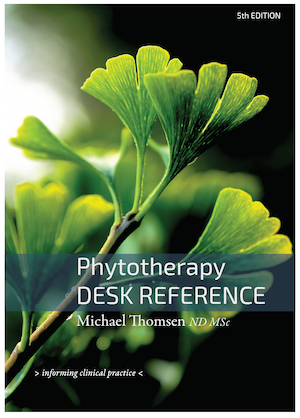Phytotherapy Blog
Herbal Medicine Week
#HerbalMedicineWeek #NHAA #Naturopathy #WesternHerbalMedicine #PhytotherapyDesk
Herbal Medicine Week - Naturopaths & Herbalists Association of Australia (NHAA)
Trusted by herbalists for 22 years
200 jam-packed pages: Monographs, therapeutic dosages, actions and indications.
233 Monographs. Includes all herbal extracts used by Australian herbalists! Prescribe with confidence. Explore new options!
This lovely tree grows right outside our bedroom window. It is the first thing we see every morning...
Withania somnifera Clinical Trials Review By Michael Thomsen, MSc, ND
BackgroundIntroduced to Australian practitioners of Western Herbal Medicine in the mid-90s, Withania rapidly became a much-loved herb and is now one of the top selling herb in Australia and even in the UK. Ashwagandha (Withania somnifera) is used in Ayurvedic medicine to promote youthful vigour, enhance muscle strength and endurance, and improve overall health. Ashwagandha's popularity is no doubt related to its use as a relaxing or non-stimulating adaptogen and tonic and because it is considered safe for use in children.
Withania ReviewTandon et al. (2020) published a review of withania, which included studies published up to early 2019 1. No meta-analysis was performed presumably due to a paucity of studies for each condition.
MethodsA systematic search both for indexed and non-indexed literature was made for W. somnifera using various search engines and databases and the details of research articles pertaining to all clinical trials/human studies, animal studies addressing safety issues of CNS, CVS, general toxicity, mutagenicity, genotoxicity, re-productive safety and herb-drug interactions were reviewed and compiled comprehensively from full texts.
ResultsA total of 69 (39 pre-clinical and 30 clinical) studies documenting efficacy and safety aspects were identified and the desired information of these studies is comprehensively presented in this review.
Retrieved thirty (30) human studies demonstrated reasonable efficacy of root preparations in:
- 1.subclinical hypothyroidism (1)
- 2.schizophrenia (3)
- 3.chronic stress (2)
- 4.insomnia (2)
- 5.anxiety (1)
- 6.memory and cognitive improvement (2)
- 7.obsessive-compulsive disorder (1)
- 8.rheumatoid arthritis (2)
- 9.type-2 diabetes (2)
- 10.male infertility (6)
- 11.fertility promotion activity in females (1)
- 12.adaptogenic (3)
- 13.growth promoter in children (3)
- 14.chemotherapy adjuvant (1)
Reasonable safety of root preparations of Aswagandha has been established by these retrieved 30 human trials.
- No serious adverse events or any changes in haematological, biochemical or vital parameters were re-ported in these human studies.
- Only mild and mainly transient type adverse events of somnolence, epigastric pain/discomfort and loose stools were reported as most common (> 5%); and giddiness, drowsiness, hallucinogenic, vertigo, nasal congestion (rhinitis), cough, cold, decreased appetite, nausea, constipation, dry mouth, hyperactivity, nocturnal cramps, blurring of vision, hyperacidity, skin rash and weight gain were reported as less common adverse events.
- Pre-clinical chronic toxicity studies conducted up to 8 months also found root extracts to be safe.
- No mutagenicity or genotoxicity was reported for the root; only mild CNS depression and increase in thyroxine (T4) levels were reported with root by some studies. Further, there was no in-vitro and in-vivo inhibition seen forCYP3A4 and CYP2D6, the two major hepatic drug metabolizing enzymes.
- Root of the Ayurvedic drug W. somnifera (Aswagandha) appears a promising safe and effective traditional medicine for management of schizophrenia, chronic stress, insomnia, anxiety, memory/cognitive enhancement, obsessive-compulsive disorder, rheumatoid arthritis, type-2 diabetes and male infertility, and bears fertility promotion activity in females, adaptogenic, growth promoter activity in children, and as adjuvant for reduction of fatigue and improvement in quality of life among cancer patients undergoing chemotherapy. Properly designed, randomized-controlled, large-size, prospective trials with standardized preparations are needed to ascertain efficacy of Aswagandha root in previously studied and other new indications.1
1.Tandon N, Yadav SS. Safety and clinical effectiveness of Withania Somnifera (Linn.) Dunal root in human ailments. J Ethnopharmacol 2020;255:112768.
Michael Thomsen is herbalist and naturopath. Originally from Denmark, he completed studies in Naturopathy and Herbal Medicine in Sydney, graduating in 1986. Michael specialises in integrative oncology supporting patients with lifestyle and dietary advice, nutritional and herbal medicines and hyperthermia via allied clinics. His company, Eusano Healthcare, has pioneered whole body and local hyperthermia in Australia, importing and distributing ARTG listed medical infrared and hyperthermia devices made in Germany. He has a Master of Science, Graduate School of Integrative Medicine, Swinburne University and is currently a PhD scholar at Sydney University Medical School. Michael is researching chemotherapy-induced mucositis, intestinal dysbiosis and the possible role of probiotics as adjunct medicines in cancer care. Michael has extensive industry experience as past technical manager of leading herbal medicine companies in Australia.
He is the author of the popular Phytotherapy Desk Reference now in its fifth edition having sold 10,000 copies worldwide. www.phytotherapydeskreference.com
When you subscribe to the blog, we will send you an e-mail when there are new updates on the site so you wouldn't miss them.




 I firmly believe in the value and preservation of traditional medicine. I work to inform health professionals about the incredible value of medicinal plants and I work with industry to improve the quality of the medicinal products made from medicinal plants and nutrients.
I firmly believe in the value and preservation of traditional medicine. I work to inform health professionals about the incredible value of medicinal plants and I work with industry to improve the quality of the medicinal products made from medicinal plants and nutrients.